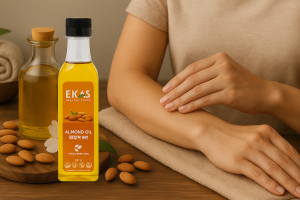Dry skin is more than just an inconvenience; it’s uncomfortable, itchy, and sometimes even painful. If you’re constantly battling flaky patches, rough texture, or that tight feeling after washing your face, you might be wondering, does almond oil help with dry skin? The short answer? Yes! But let’s break down exactly why it works and how to use it for the best results.
What is Almond Oil?
Before we dive into how almond oil helps with dry skin, it’s important to understand what makes this oil special. Extracted from almond kernels, this nutrient-rich oil is a powerhouse of hydration.
There are two types of almond oil: sweet almond oil and bitter almond oil. Sweet almond oil is the one you want, it’s packed with vitamins and fatty acids that nourish and protect the skin. For the best results, opt for cold-pressed almond oil, which retains the most beneficial nutrients.
Why Does Skin Get Dry?
To fully understand how almond oil helps with dry skin, let’s look at the main causes of dryness:
- Weather Changes – Cold air, harsh winds, and indoor heating strip the skin of moisture.
- Overwashing – Frequent cleansing with harsh soaps removes natural oils.
- Hot Showers – Prolonged exposure to hot water weakens the skin barrier.
- Aging – The skin naturally produces less oil over time, leading to increased dryness.
- Harsh Skincare Products – Ingredients like alcohol and sulfates deplete moisture levels.
If any of these sound familiar, you need a moisture-locking solution. So, does almond oil help with dry skin? Let’s find out.
How Does Almond Oil Help with Dry Skin?
1. Seals in Moisture Without Feeling Greasy
Unlike heavy creams that can clog pores, almond oil helps with dry skin by forming a breathable barrier that prevents moisture loss. It absorbs quickly, keeping skin soft without a greasy residue.
2. Packed with Vitamin E
One of the biggest reasons almond oil helps with dry skin is its high vitamin E content. This powerful antioxidant protects against environmental damage while promoting skin repair and hydration.
3. Loaded with Essential Fatty Acids
Rich in omega-6 and omega-9 fatty acids, almond oil penetrates deeply, softening rough patches and restoring the skin’s natural barrier.
4. Soothes Irritation and Redness
If your dry skin is prone to irritation, almond oil’s anti-inflammatory properties can help calm redness and itching. This makes it ideal for sensitive skin types.
5. Aids in Skin Repair
By nourishing the deeper layers of the skin, almond oil helps with dry skin by accelerating healing and preventing further moisture loss.
How to Use Almond Oil for Dry Skin
1. Daily Moisturiser
Apply a few drops of almond oil to damp skin after a shower to lock in moisture. This prevents dryness throughout the day while leaving your skin feeling soft and nourished. Focus on areas prone to flakiness, like elbows, knees, and hands. For best results, gently massage until fully absorbed.
2. Night Treatment
If your skin feels extra dry, use almond oil as an overnight treatment. Before bed, apply a generous amount to your face, hands, or any dry patches. The oil works while you sleep, deeply hydrating and repairing your skin barrier. Wake up to a smoother, more radiant complexion.
3. Bath Oil
Adding a few drops of almond oil to warm bathwater creates a luxurious, spa-like experience. It hydrates your skin while you soak, leaving it soft and supple. This method is especially helpful in winter when dryness is at its peak.
4. Lip Balm
Chapped lips? Almond oil helps with dry skin on your lips, too. Dab a small amount on dry lips for instant relief and long-lasting hydration. It’s a natural alternative to store-bought lip balms, free from synthetic ingredients.
5. Makeup Remover
Almond oil is a gentle yet effective makeup remover. Massage a few drops onto dry skin to dissolve makeup, including waterproof mascara. Rinse with warm water and follow up with a gentle cleanser for a clean, hydrated face.
Almond Oil vs Other Dry Skin Remedies
| Feature | Almond Oil | Coconut Oil | Shea Butter |
| Absorption | Lightweight, absorbs quickly | Can feel greasy on some skin types | Thick, slower absorption |
| Key Nutrients | Vitamin E, fatty acids, antioxidants | Lauric acid, vitamin E | Vitamins A and E |
| Best for | All skin types | Very dry or flaky skin | Rough patches and cracked skin |
| Ease of Use | Simple, non-sticky application | May require melting in cold weather | Best for targeted areas |
While coconut oil and shea butter are effective, almond oil helps with dry skin in a way that’s lightweight yet deeply nourishing, making it a great everyday solution.
Does Almond Oil Help with Dry Skin for Everyone?
For most people, almond oil helps with dry skin without causing irritation. Its lightweight texture and nutrient-rich composition make it suitable for all skin types, including sensitive skin. However, if you have a nut allergy, it’s best to avoid it, as it could trigger an allergic reaction. Always do a patch test by applying a small amount to your inner arm and waiting 24 hours to check for redness, itching, or discomfort. If no reaction occurs, you can safely use almond oil to help with dry skin and enjoy its deep hydration benefits.
Final Thoughts: Should You Try Almond Oil for Dry Skin?
So, does almond oil help with dry skin? Absolutely! It’s one of the most effective, natural solutions for keeping skin hydrated, smooth, and healthy.
If you’re tired of dealing with dryness, almond oil is a simple, affordable, and effective remedy. Ready to give it a try? Your skin will thank you.




